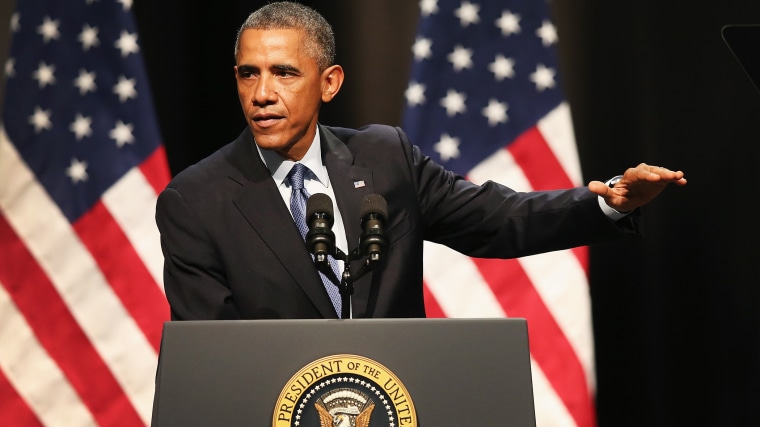Sometimes, we can see a media blitz coming. When President Obama said over the summer that he was still formulating a strategy for dealing with ISIS in Syria, it seemed pretty obvious that Beltway would immediately scream, "Gaffe!" When he said intelligence agencies underestimated ISIS's capacity, this too quickly picked up the "gaffe" label.
This one, however, came as a bit of a surprise.
President Barack Obama gave Republicans a gift of sorts by confirming their midterm election narrative that next month's balloting is a referendum on his policies. Within hours, GOP candidates across the election landscape capitalized on his words with ads tying their Democratic opponents to the unpopular president. Struggling three-term Republican Sen. Pat Roberts of Kansas, facing an independent without a Democrat on the ballot, was the first Friday to air an ad featuring Obama's comments from a speech Thursday in Evanston, Ill.
The Washington Post was so struck by the significance of Obama's comments that it published two separate pieces on the comment.
Even David Axelrod, a longtime Obama ally, said on "Meet the Press" yesterday that the president's unscripted remark was "a mistake."
Given all of this pushback, it's worth taking a moment to acknowledge exactly what Obama said.
From the transcript:
"Now, I am not on the ballot this fall. Michelle is pretty happy about that. But make no mistake: These policies are on the ballot -- every single one of them."
And in context, what are "these issues"? A minimum-wage increase, infrastructure investment, job creation, pay equity, economic inequality, paid leave time, immigration reform, preschool access, and investments in clean-energy technology. As far as Obama's concerned, "every single one" of "these issues" are "on the ballot" in 2014.
It's an assessment that happens to be true. A Republican-led Congress will ignore any attempt to work on these issues; a Democratic-led Congress would do the opposite.
In other words, what Obama said was entirely accurate -- if voters want to see work done on these issues, they'll have to vote for candidates who will choose to make them a priority. What's more, based on all of available data, most Americans agree with the Democratic position on most, if not all, of these issues. So why exactly are we to believe this was an embarrassing slip-up?
If I'm understanding the Beltway argument correctly, by acknowledging that these issues are on the ballot, the president has made it easier for Republican candidates to say, "If you don't like Obama, vote Republicans, since they'll oppose Obama's ideas." In fact, the RNC's Reince Priebus was so eager to seize on the president's comments that he changed the quote from "these issues" to "my issues" to make the connection more direct -- voters can't vote against Obama per se, but they can vote against his top priorities.
But it's a tough sell. For one thing, Republicans have spent the last several months making this argument anyway, blasting just about every Democratic incumbent as some kind of rubber stamp for the White House. For another, the president was actually making the opposite point to the one the Beltway heard -- Obama was effectively telling the public, "The election isn't about me; it's about these issues that the country cares about."
And given that the American mainstream actually wants a minimum-wage increase, infrastructure investment, job creation, pay equity, and on and on, seizing on this as some kind of cringe-worthy "gaffe" seems pretty silly.
